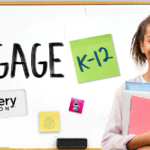Amy Leask is an educator, community philosopher, and an award-winning author and interactive children’s media producer. She is the founder of Red T Media, in Milton, Ontario, Canada. We recently had the pleasure of sitting down with her to learn more about her work with Red T Media.
Q: What does Red T Media do?
A: Red T Media produces a range of children’s materials that focus on teaching children thinking skills through philosophical questions. Our offerings include print books, interactive eBooks, audio books, apps, video series, and classroom/home resources. It’s been our pleasure to engage children, parents and teachers for almost 10 years.
Q: Why should PreK-12 educators be aware of what you are doing regarding educational equity and accessibility?
A: We were founded on the notion that all thinkers, of all ages, should be taught how to think, instead of just what to think. We also believe that there is no such thing as a “typical” learner. Not only do we strive to bring a range of ages into the conversation, but our materials feature both female and male thinkers, from around the world, and throughout history. In addition, we’ve never limited ourselves to just one medium, because we know that the more avenues into philosophy we create, the wider the range of needs we’ll be able to address. We also make all the resources on our “Teach” page free to download, so that cost is not an obstacle.
There’s a reason why philosophy has been around for thousands of years, and has been done in all human cultures. Our desire to ask “Why?” is universal, and opportunities to do so, to be heard, and to join a community of thinkers should be universal as well. The ripple effect of teaching a child to think philosophically is phenomenal. It extends to their family, their community, and beyond. Best of all, it’s much easier to include it in everyday classroom activities than you’d think, and a little goes a long way.
Q: What are you most proud of about Red T Media in today’s educational landscape?
A: We’re most proud that we can celebrate a child’s desire to ask big questions, and that we are able to meet 21st century learners wherever they feel most at home, in a variety of media. The skills a child develops in philosophy, as well as the questions that arise when they’re introduced to it can help them to succeed in any subject area, as well as in their social and emotional development.
Q: What do you think is the greatest challenge in education today?
A: We’ve never met a teacher who didn’t want to do right by their students, but we have met an awful lot of them who don’t have the time, space, or resources to really reach students as individuals. Limited resources means a less diverse range of learning experiences available, and less of a chance for each child to figure out what really drives them to learn.
Q: What does the term EDUCATIONAL EQUITY mean to you?
A: For us, educational equity means giving as many learners as possible the opportunity and support to inquire, experiment, explore, create, sometimes mess up, and fix things. We like to think that every child is a budding philosopher, and given the opportunity and a little bit of structure, he or she can grow as a thinker.
Q: Equity and accessibility are always cited as top concerns, along with student privacy, for school districts these days. Knowing this, does Red T Media approach product development from an equity and accessibility point of view?
A: Every product we’ve ever developed has been released in more than one format, because we recognize that there will be more than one kind of learner using it. Taking a multimedia approach makes it easier for users to access our materials in other countries and makes it more likely that discussions will follow kids home. We try to choose themes that will appeal to many, create a diverse range of characters, and make big questions more appealing with humor. With respect to privacy, we don’t believe in collecting information about users anymore that necessary, and are proud to have our videos and apps designated specifically for children.
Q: Put Red T Media into the realm of equity in education. We know you care and always have. Too many companies simply say the word and do nothing else. Please feel free to expound on this.
A: Our goal is and always has been to have impact on children as thinkers. Philosophy is so much more than an academic subject to be studied at colleges and universities. Anyone and everyone can benefit from it, and it should be available to and encouraged in everyone. We create things that are educational, accessible, and enjoyable, and wherever we can, we provide supplementary materials that are free. We’re thrilled to have won awards for several of our publications, and absolutely love hearing from parents and teachers that something we created started a conversation.
Q: All schools need to know that their vendor partners are producing products that comply with state regulations, district rules, etc. How does a school district know that your products are compliant with their needs?
A: Being educators ourselves, we’ve created lesson plans and supporting materials for all our books, interactive eBooks, and video series, so that teachers can tie them to rich tasks in the classroom. Each lesson plan includes learning objectives, cross-curricular connections, tips for adapting the material to multi-level classroom, as well as extension activities. We want to make it easy for a teacher to include our products in their daily activities, but also tie expectations for a number of subject areas into it as well.
Q: How does Red T Media approach the needs of ESL/ELL students?
A: We’ve actually had ESL/ELL teachers with adult students tell us they’ve used our books in their classes, which is wonderful. They’ve told us that the books present interesting, meaty ideas, through language that’s accessible. With respect to younger learners, part of our motivation for working in a variety of media is that a game, an app, or a video can sometimes be less intimidating to someone learning a new language than a traditional print book. We enable thinkers to draw their thoughts, in addition to or instead of writing them, and include mini-games and activities that walk players through a thought process. Our lesson plans are often built on an art project, or some other hands-on activity. Having taught philosophy to ESL/ELL learners myself, I’ve seen people really come out of their shell when the right big question is asked. Philosophy can be a powerful catalyst in encouraging learners to take risks in their spoken and written work.
Q: School districts are very concerned about equity for all students. We know you are too. How has this changed the way you work with school districts?
A: We try to reach as many children, teachers and parents as we can. For us, that means imagining ways that we can appeal to as many different learners as possible. We don’t generally deal directly with school districts, but we do try to make it as easy as possible for individual teachers to bring philosophy into their classroom. We look forward to the day when philosophy is adopted as a subject area in the curriculum everywhere.
Q: Ed tech makes a big difference out there in terms of accessibility. How does Red T Media make a difference?
A: Technology has been one of the pillars of our company from day one. Our very first books were published in print form and as interactive eBooks simultaneously. Philosophy isn’t generally associated with technology, but it’s been a wonderful challenge to translate age-old questions into games and apps. We recognize that there’s no substitute for in-person dialogue, especially in our subject area, but a little technology can make it much easier for reluctant readers, remote learners, and children with particular learning challenges to join in. Generally speaking, 21st century learners don’t see tech as a luxury. It’s just part of the learning landscape. We’re really just trying to reach out to them with media they’re already comfortable with.
Q: What do you see as the most important trend in education today?
A: The desire to engage the whole child is so important, and it’s wonderful to hear so much about personalized and social-emotional learning. Children are capable of such rich, wonderful, and surprisingly complex conversations, and we love to see them being empowered to speak up. We hear from so many parents and educators who bring up a big question, only to have a child tell them “I’ve been thinking about that for ages. Why did you wait so long to ask me?” Students are so much more than their marks, and it does our hearts good to see them acknowledged as thinkers.
Q: Accessibility and equity issues also effect educators. The best teaching happens when teachers have up to date materials and/or technology. What are your thoughts on this?
A: I absolutely agree. Teachers need to be given the time, space and resources to provide lots of different learning experiences, and to support their students as they try new things. It’s important not to be taken in by every cool, flashy idea that comes along, but it’s also so important to give teachers the flexibility to try new approaches and tools. Teachers know their students, and they know their own style as educators. It’s ideal when they have the ability to pick and choose what will really work, from a wide variety of resources.
Q: Anything else you’d like to add? And how can our readers learn more about Red T Media?
A: We’d love to see many educators try philosophy in their classrooms, and we invite them to explore all of the resources we have to offer, and also contact us with questions. Red T Media can be found at:
- RedTKids.com
- Twitter: @RedTKids
- Facebook: Red T Media
- Instagram: Red T Media
- YouTube: Red T Kids’ Media
The American Consortium for Equity in Education, publisher of the "Equity & Access" journal, celebrates and connects the educators, associations, community partners and industry leaders who are working to solve problems and create a more equitable environment for historically underserved pre K-12 students throughout the United States.
- American Consortium for Equity in Educationhttps://ace-ed.org/author/admin/
- American Consortium for Equity in Educationhttps://ace-ed.org/author/admin/April 23, 2025
- American Consortium for Equity in Educationhttps://ace-ed.org/author/admin/
- American Consortium for Equity in Educationhttps://ace-ed.org/author/admin/







